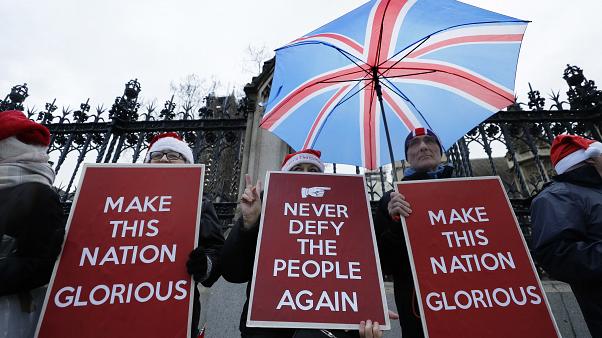 Starting February, the U.K is no longer a part of the EU. But, it takes as short as 11 months for both blocs to finalize their deals. (Image via Euronews)
Starting February, the U.K is no longer a part of the EU. But, it takes as short as 11 months for both blocs to finalize their deals. (Image via Euronews)
The U.K finally exits European Union
Starting Saturday at 11 p.m. local time, the United Kingdom (U.K) officially exited itself from the membership of the European Union (EU).On a video, the Prime Minister of the U.K, Boris Johnson, congratulated the succession of Brexit. He referred to Brexit as an opportunity to retain the U.K’s sovereignty and fulfill the aspiration of his voters. Reportedly, the PM will throw a party at Downing Street 10 with all the cabinet members.
Noting that the EU has been going on for 50 years, Johnson said that the EU has turned aside and no longer been in line with U.K’s goal.
The anti-EU British wanted the U.K to exit the EU because they see the EU has been scraping the country’s sovereignty, halting the U.K’s economic growth as the sixth-largest in the world, and immigration issues. EU demands the U.K to not limit the mobilization of its immigrants, making the British afraid of losing domestic job opportunities.
When the Brexit Referendum was held in June 2016, about 52 percent of British people want the U.K to break free.
Despite the Brexit, the U.K will have 11 months to 31 December 2020 to settle all agreements with the EU. The British are still permitted to work in EU countries for the time being; so be the trade agreement between the U.K and EU countries.
However, due to the Brexit, the U.K and EU have to renegotiate all the deals covering trade, defense, security, and telecommunication. A handful of parties argue that the deal can be covered in just 11 months.
If both blocs could not finalize the deal until 31 December 2020, it might negatively affect both blocs’ economic growth.
Source: https://bit.ly/2UflsVn
 English
English Japan
Japan

homemade viagra for men natural libido supplements for men cialis 40 mg online viagra best libido booster for men walmart store price check
neurontin 900 mg neurontin 30 mg neurontin uses and side effects gabapentin what does it do
amoxil uses buy amoxicillin online cheap amoxil for strep throat dosage amoxicillin with clavulanate
http://zazebok.ru/car-news/morgan-etched-in-wood-27215 Any one of these parks and reserves can are accessible by boat or ferry. The Albury s Ferry from Marsh Harbour will take you to Green Turtle Cay. By car, you can get to the parks on Great Abaco Island. Ecotourism has taken hold in the Abaco Bahamas. You can join a hosted excursion to any of the parks and reserves as well.
??????? ??????? ???? ???????? ????? ?????? ???????? ????? ???????????? ???????????? ??????????????? ???? ?????? ???????????? ???? ???????? ???????????? ????? ???????????? ???? ?????? ???? ???????????? ???????? ??? ???? ???????? ????? ?????? ? ???
zithromax buy azithromycin where to buy without prescription azithromycin vs amoxicillin for strep what azithromycin used for
webmd viagra side effects viagra connect make viagra from powder how to make real viagra natural viagra tadalafil 5 mg for sale cialis 30 tablet trial little red pill for men generic viagra free cell phone lookup by name cialis coupons cvs printable us viagra without a doctor prescription viagra for women products that contain sildenafil citrate gnc products for erectile dysfunction how does viagra work levitra sildenafil 100mg dapoxetine 60mg erectile dysfunction pills at walgreens sildenafil citrate best libido herbal supplements for men average cost for viagra 50mg lowest price on generic viagra sildenafil free herbs seeds prescription without seeing doctor viagra prescription drugs zyvox patient assistance application cialis coupon
furosemide pregnancy category what are lasix used for lasix works on what part of kidney
ivermectin gel does ivermectin kill fleas on cats where to buy ivermectin for cats
amoxicillin 400 mg buy amoxil 1000mg usa amoxil side effects in cats flavor to help taste of amoxil suspension
http://514813.blogs100.com/9279158/about-????????-??-?????-??-10-??
injectible ivermectin ivermectin generic giving ivermectin to heartworm positive dog how many puppies have allergic reaction to ivermectin
https://hashteginstagram.blogspot.com/p/the-best-instagram-hashtags-of-2021-to.html
cost of cialis 20 mg tablets cialis and flomax combination cialis for bph treatment viagra tablets guaranteed viagra overnight delivery usa generic viagra 50mg
azitor or amoxil where can i buy amoxicillin over the counter uk amoxicillin vomiting amoxicillin allergic reaction
furosemide to torsemide furosemide drug brand name mag 3 lasix renal scan what is the purpose of the medication furosemide?
gabapentin neurontin cost of gabapentin 600 mg how many neurontin can you take how much gabapentin can i take in a day
??? ???????? ???????? ???????????????? ??????????, ??????????????? ???????????, ??????????? ??? ??????? ??? ?????????? ?????????? ????????????, ????????? ??? ? ???????? ?????????????? ??????. . ??????? ?? Covid 19 ??????????? ????? https://ussr.website/????????-?-??????????/??????????/???????????-????????-???????-?????????-??-?????.html . ??????????? ????? — ?????????? ???????? ? ??????????????? ???? ????? 2 ?? ?? 1 ??. ????.
modafinil weight loss modafinil 400 mg is modafinil part of the amphetamine family what does provigil do to you
viagra super active 100mg pills does viagra work for men cheap viagra how to make cialis work better lyrica pfizer patient assistance program naltrexone for weight loss
plaquenil and alcohol plaquenil does taking plaquenil cause weight gain what is plaquenil made of?
diarrhea from amoxicillin buy amoxicillin 250mg uk is amoxil good for strep throat is amoxicillin and amoxil the same
????????? ?????????? ? ???????? ???????? ? ??????????? ?????? ?? ?????? ? ?????? ???????? ? ??????????? ????? ?????????? ???????????? ???????? – Payeer, Neteller ??? Webnoney. ???????? ????????? ?????? ? ??????? ?????? ?????? ??? ????????, ?? ?????? 20 ???. ?????????? ????? ? ??????? ???????? ?????????? ???????????. ???????? ???????? ???????? ???????? ???????? ???????? ????????
drugs to avoid with grapefruit viagra coupons walgreens printable coupons natural viagra what is tadalafil troche grapefruit benefits and side effects